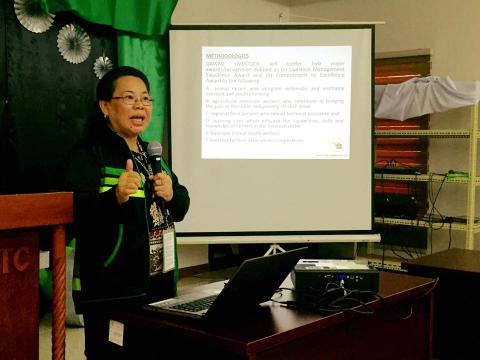CDMS Chief Teodosia D. Jaraba convened 20 attendees today consisting of Provincial and City veterinarians coming from the five different provinces of the region. The 1st Consultative Meeting for Gawad Livestock intends to facilitate and come up with nominees on a regional level to be vouched for Gawad Livestock during the National Livestock Summit with its awarding ceremony taking place sometime in November.
ATI Training Hall, EL SALVADOR CITY--- Realizing the importance of sustaining the livestock supply in the country, the National Livestock Program of the Department of Agriculture (DA) will conduct a National Livestock Summit. The activity will highlight the importance of livestock farming along with grains and crops which is a profitable and sustainable venture. The mounting of the activity also entails the giving of recognition among livestock farmers through its first ever Gawad Livestock.
Through Gawad Livestock, the giving of awards intends to acknowledge exemplary farmers engaged in the livestock sector for their commitment and support in the advocacy of the National Livestock Program; to empower and encourage farmers to engage in systematic and profitable livestock and poultry farming and to recognize the sector’s vital role in the economic development and community welfare of the country.
On its first consultative meeting, Career Development and Management Services (CDMS) Chief Teodosia D. Jaraba convened 20 attendees today consisting of Provincial and City veterinarians, DA-RFO, RAFC, CMU College of Veterinary Medicine, and other government agencies of Region X. The meeting intends to facilitate and come up with nominees on a regional level to be vouched for Gawad Livestock with its awarding ceremony taking place in November 25-27, 2019.
Among the agreements agreed upon is the ATI-RTC X through its Information Services Section (ISS) will help package a five-minute video footage of the nominee’s farm, animals, farming activities and other relevant information. The scrapbook and other supporting documents prepared by the respective LGUs will be later submitted to the Technical Working Group (TWG) for evaluation.
The Gawad Livestock will confer two major awards/recognition dubbed as Livestock Management Excellence Award and Commitment to Excellence Award to the following: (1.) Animal raisers who integrate systematic and profitable livestock and poultry farming, (2.) Agricultural Extension workers (AEWs) who contribute in bridging the gaps in the urban and poverty-stricken areas, (3.) Regional Focal Persons who extend technical assistance, (4.) Learning Sites (LS) which enhance the capabilities, skills and knowledge of farmers in the livestock sector, (5.) Barangay Animal Health Workers and (6.) Livestock farmers associations/cooperatives.

